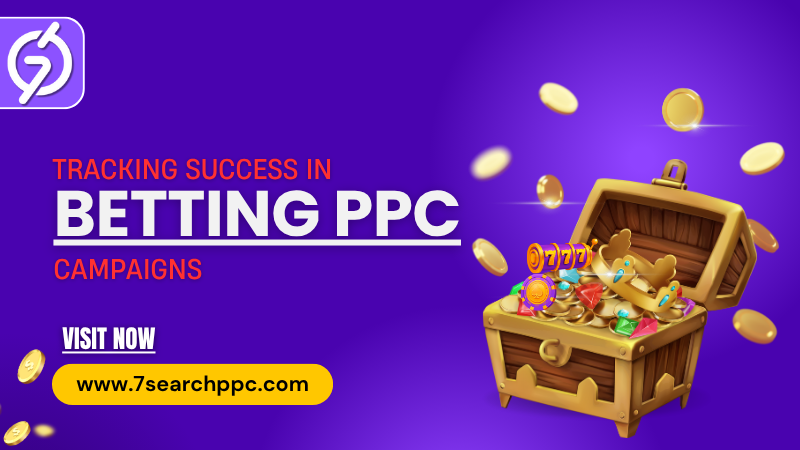The digital advertising world moves fast, but few sectors evolve as quickly or as competitively as online betting. Over the last few years, betting platforms have invested heavily in paid promotions to attract punters. Yet one question remains constant for advertisers: how do you actually know if your betting PPC campaigns are working?
The ability to track and measure performance in betting advertising is not just about counting clicks or impressions—it’s about understanding user intent, behavior, and the ultimate value of every conversion. In this article, we’ll explore practical, data-driven ways to monitor your campaign success and optimize for real profitability.
To learn more about creating optimized campaigns that deliver high returns, you can also explore betting PPC insights and discover the best betting ad strategies for maximum profits.
The Real Numbers Behind the Betting Ad Rush
According to industry data from recent ad spend reports, global online betting ad budgets have grown by over 20% year-over-year. With this rise, competition has become fiercer, and so has the cost of every click. In 2025, the average cost-per-click for online betting ads increased by nearly 18% in regulated markets, making efficiency and measurement more critical than ever.
But despite pouring huge sums into betting PPC campaigns, many advertisers are still unsure if their investment is yielding the right results. They see clicks, traffic spikes, and maybe a few conversions—but the big picture often remains blurry.
The Data Fog in Betting Advertising
One of the biggest frustrations for advertisers running betting paid campaigns is the data fog. You’re spending hundreds or even thousands of dollars weekly, yet the reports don’t clearly explain whether your traffic is valuable or just vanity metrics.
Here’s a common scenario: you’re running a Google Ads or 7Search PPC campaign for a sportsbook or casino brand. The CTR looks good, and impressions are up. But conversions? Not so much. You tweak bids, add new keywords, refine targeting—but the return still doesn’t quite justify the spend.
The issue isn’t your creativity—it’s your measurement.
Without the right tracking systems, you’re essentially running campaigns blindfolded. You might be paying for clicks that never convert, missing signals of high-value players, or ignoring metrics that reveal long-term profitability.
In betting advertising, understanding player lifetime value (LTV), acquisition cost (CPA), and retention data is what separates smart advertisers from those who just burn through budgets.
What Successful Advertisers Actually Track
Seasoned marketers in the betting space don’t rely on surface-level data. Instead, they build a deeper system for campaign measurement. The goal is not just to “get more clicks” but to identify the clicks that matter most.
Here’s how they do it:
Conversion Tracking Beyond Sign-Ups
In the world of betting PPC, a simple registration or account creation isn’t enough to call it a conversion. Successful advertisers track user engagement after sign-up—did the user deposit funds, place a bet, or return within seven days?
These post-registration actions define real success and are essential for refining ad targeting and budgets.
Segmentation by Traffic Source
A good betting ad campaign attracts traffic from multiple sources—search, display, social, and direct ad networks. Each source performs differently. By segmenting results, advertisers can see which platform brings the highest-value users and adjust bids or creatives accordingly.
Attribution Modeling
Modern advertisers move beyond “last-click attribution.” They analyze the entire journey. For example, a bettor might click a display ad first, read content later, and only convert after a search ad. Multi-touch attribution helps you understand which part of the journey deserves credit.
Tracking Retention and LTV
A betting advertiser’s true ROI lies in player lifetime value. One user depositing $50 a week for six months is worth more than ten users who sign up once and never return. Integrating CRM or analytics tools with ad data gives a full picture of player worth over time.
Analyzing Keyword Intent
Every keyword isn’t equal. Someone searching “free sports betting tips” might not convert like someone searching “bet on Premier League live.” Segmenting keywords by intent helps refine targeting, reduce wasted spend, and boost profitability.
How Smarter Tracking Builds Profitability
The smarter approach to betting PPC campaigns starts with building a connected ecosystem—one that ties together ad spend, user activity, and conversion behavior.
Advertisers who win in this space don’t just “run ads”; they build feedback loops. Every conversion, click, and deposit becomes data that feeds the next optimization cycle.
Imagine this: you’re using 7Search PPC or another betting ad network. You start tagging each campaign with UTMs, integrating Google Analytics or a tracking dashboard, and syncing deposit data from your backend. Within a few weeks, you realize that mobile ads on weekends are producing 40% more active depositors. That insight alone can help you double down where the real value lies.
If you want to explore reliable ad networks designed for this vertical, you can check out this trusted betting ad network for targeted traffic and performance optimization opportunities.
The Core Metrics That Define Success
Let’s go deeper into the actual metrics that matter when tracking betting advertising success. Each one tells a unique story about your campaign’s effectiveness.
- Click-Through Rate (CTR) – Reflects ad relevance and appeal. A high CTR means your ad messaging aligns with audience intent, but remember, clicks without conversions are just noise.
- Conversion Rate (CVR) – This measures how many clicks result in meaningful actions like sign-ups, deposits, or bets. It’s the ultimate reflection of ad effectiveness.
- Cost Per Acquisition (CPA) – How much are you paying to acquire one real player? Lowering CPA without hurting conversion quality is the holy grail of performance marketing.
- Return on Ad Spend (ROAS) – The revenue generated per dollar spent on ads. A ROAS above 4:1 is usually healthy for betting platforms.
- Lifetime Value (LTV) – LTV determines whether your marketing strategy is sustainable. If LTV exceeds CPA by at least 3x, you’re running a profitable operation.
- Bounce Rate and Session Duration – If users leave too soon, your landing page or ad intent might not align. Measuring on-site engagement helps improve ad-to-page continuity.
- Deposit Rate – In betting PPC, this is the most telling metric. Not all sign-ups are valuable, but tracking how many users actually deposit turns vague success into tangible data.
Common Mistakes That Skew Performance Tracking
Many advertisers unknowingly measure their campaigns incorrectly. Here are a few pitfalls to avoid:
- Overemphasis on vanity metrics: Impressions and clicks don’t equal conversions. Always tie metrics back to deposits or revenue.
- Ignoring device segmentation: Mobile and desktop audiences behave differently. Without device-level data, optimization becomes guesswork.
- Not updating conversion windows: Bettors may take hours or days before converting. Short windows can undercount actual performance.
- Neglecting compliance filters: Betting ads often face stricter rules. Track approval rates and ad visibility in restricted regions to avoid wasted budget.
Building a Reliable Tracking Framework
Here’s a structured way to set up performance tracking that works across platforms:
- Use UTM Parameters: Tag every campaign, keyword, and ad variation. It’s a simple but powerful step that ensures clarity in analytics.
- Integrate with Analytics Tools: Google Analytics, Voluum, and proprietary dashboards from ad networks help you consolidate all performance data.
- Sync Backend Data: Connect your CRM or platform to capture deposits and player actions.
- Set Up Custom Goals: Define what counts as a meaningful conversion—deposits, repeat bets, or user retention milestones.
- Automate Reporting: Weekly performance reports help catch trends early and keep your team focused on optimization.
Why Measurement Dictates Strategy
When you can measure effectively, you can plan better. The biggest advantage of mastering measurement is that it shifts your mindset from “spend more” to “spend smarter.”
For example, imagine you discover that 70% of your profitable conversions come from mobile traffic in certain regions. You can then reallocate budgets, personalize ad creatives, and fine-tune bidding strategies—all backed by real data.
Measurement doesn’t just show you what worked—it tells you why it worked. That’s the insight that allows brands to evolve from short-term wins to consistent profitability.
The Feedback Loop Approach
One of the most effective ways to maintain profitability in betting PPC campaigns is to establish a feedback loop between your analytics and ad strategy.
- Track → Analyze → Refine: Each campaign’s data becomes the seed for the next.
- Find patterns: Identify times, devices, or geographies that yield better conversions.
- Test creatives: Data-backed A/B testing on visuals, CTAs, and landing pages can drastically improve conversion rates.
- Optimize bids: Don’t increase bids blindly. Optimize them where the data shows clear value.
When advertisers commit to continuous learning through data, campaigns start working for them, not against them.
The Human Side of Measurement
Here’s an overlooked truth: successful advertising isn’t just about dashboards and charts—it’s about interpretation. Numbers don’t speak for themselves.
You could have identical data sets but two marketers who read them differently. The key is context. Data needs to be connected with real market understanding—seasonal trends, player motivations, event calendars, and even sports schedules.
In the betting industry, events like tournaments, championships, or derby weeks can heavily influence campaign success. Smart advertisers overlay data insights with human context to make smarter choices.
Ready to Put Tracking into Action?
If you’re ready to apply these insights and run measurable, profit-driven campaigns, it’s time to create an ad campaign on a platform designed for precise targeting and transparent performance tracking.
When your campaigns start feeding you real, actionable data, every dollar spent turns into a strategic investment—not a gamble.
A Real Conversation About Growth
Let’s be honest—betting advertising isn’t easy. You’re juggling regulations, changing audience behaviors, and rising competition. But at the core of every winning campaign lies one thing: clarity.
When you know exactly where your money goes, what results it brings, and why it works, you’re no longer guessing. You’re growing.
So take the time to track your performance, interpret it wisely, and adjust continuously. Whether you’re a new advertiser testing your first campaign or an experienced marketer managing multiple betting brands, remember that true success doesn’t just come from spending more—it comes from learning faster.
And in the fast-paced betting world, the ones who learn faster always stay ahead.
Related Reads
- From Streetwear to Sophistication: The Evolution of Men’s Denim
- What Is the Role of Real-Time Monitoring in Chronic Disease Management?
- Planning Your Next Exotic Getaway: Tips for First-Time Travelers
- Redefining Branding With The Style of Custom Jeans Tags
- 5 Best ERP Software Solutions Providers in Muscat







